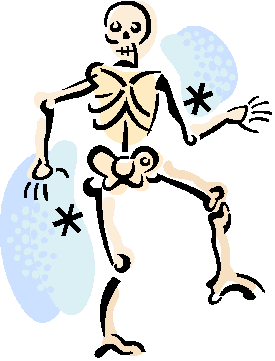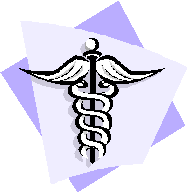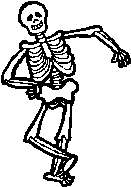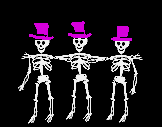
BENJAMIN RUSH

Idealistic by nature with accomplishments galore,
Rush's grand reputation is sealed ever more.
Benjamin Rush was born near Philadelphia in 1746. He lost his father when he was six and was brought up by his mother who kept a grocery shop to support and educate her seven children. Benjamin was educated under private tutors and at a private school in Maryland, and he graduated from Princeton in 1760. He studied medicine in Philadelphia, Edinburgh, London, and Paris before he began his practice in Philadelphia in the summer of 1769. He held several professorships in the Philadelphia Medical College.
He married Julia Stockton, eldest daughter of Richard Stockton, early in
1776. She was born at "Morven," the estate of Richard Stockton, near Princeton,
N. J. Well-cultivated, industrious, and kind-hearted, Dr. Rush wrote of her,
"Let me here bear testimony to the worth of this excellent woman. She fulfilled every duty as a wife, mother, and mistress with fidelity and
integrity. To me she was always a sincere and honest friend; had I yielded to
her advice upon many occasions, I should have known less distress from various
causes in my journey through life.... May God reward and bless her with an easy
and peaceful old age if she should survive me, and after death confer upon her
immediate and eternal happiness!" She encouraged Dr. Rush in his great work for
humanity, often cautioning that he needed to take better care of himself, too.
She did outlive Benjamin, dying in 1848, buried in the grave of her husband in
Christ Church burying ground, Philadelphia.
fulfilled every duty as a wife, mother, and mistress with fidelity and
integrity. To me she was always a sincere and honest friend; had I yielded to
her advice upon many occasions, I should have known less distress from various
causes in my journey through life.... May God reward and bless her with an easy
and peaceful old age if she should survive me, and after death confer upon her
immediate and eternal happiness!" She encouraged Dr. Rush in his great work for
humanity, often cautioning that he needed to take better care of himself, too.
She did outlive Benjamin, dying in 1848, buried in the grave of her husband in
Christ Church burying ground, Philadelphia.
Rush was insightful
and inventive as both a physician and psychiatrist; eg, h e
was credited with curing the yellow fever epidemic in Philadelphia. As a member
of the Continental Congress in 1776 and 1777, he signed the Declaration. He
entered the Army as surgeon general to attend the wounded in several battles of
the Revolutionary war. He also attended the sick at Valley Forge.
e
was credited with curing the yellow fever epidemic in Philadelphia. As a member
of the Continental Congress in 1776 and 1777, he signed the Declaration. He
entered the Army as surgeon general to attend the wounded in several battles of
the Revolutionary war. He also attended the sick at Valley Forge.
In 1778, he resumed his private practice, and became delegate to the Pennsylvania ratification convention in 1787. He was founder of the Pennsylvania Hospital in Philadelphia and president of the Philadelphia Medical Society. He helped found the first Bible society which began the building of Sunday Schools across America. A vigorous foe of slavery, he also helped found the Pennsylvania Society for Promoting the Abolition of Slavery and served as its president. He promoted the idea for women to be educated and helped John Adams' wife Abigail to establish one of America's first educational institutions for women in Philadelphia.
He believed in free education for all and worked hard to support the idea of free public schools, emphasizing that children should be instructed in Christian religion as he thought the "only foundation for useful education in a republic is to be laid in religion."
I shall proceed in the next place, to inquire, what mode of education we shall adopt so as to secure to the state all the advantages that are to be derived from the proper institution of youth; and here I beg leave to remark, that the only foundation for a useful education in a republic is to be laid in Religion. Without this there can be no virtue, and without virtue there can be no liberty, and liberty is the object and life of all republican governments.
Such is my veneration for every religion that reveals the
attributes of the Deity, or a future state of rewards and punishments, that I
had rather see the opinions of Confucius or Mahomed inculcated upon our youth,
that to see them grow up wholly devoid of a system of religious
principles. But the religion I mean to recommend in this
place is that of the New Testament.
A Christian cannot fail of being a republic. The history of the creation of man, and of the relation of our species to each other by birth, which is recorded in the Old Testament, is the best refutation that can be given to the divine right of kings, and the strongest argument that can be used in favor of the original and natural equality of all mankind. A Christian, I say again, cannot fail of being a republican, for every precept of the Gospel inculcates those degrees of humanity, self-denial, and brotherly kindness, which are directly opposed to the pride of monarchy and the pageantry of a court. A Christian cannot fail of being useful to the republic, for his religion teachest him, that no man "livith to himself." And lastly, a Christian cannot fail of being wholly inoffensive, for his religion teachest him, in all things do to others what he would wish, in like circumstances, thy should do to him.
By renouncing the Bible, philosophers swing from their moorings upon all moral subjects....It is the only correct map of the human heart that ever has been published....All systems of religion, morals, and government not founded upon it (the Bible) must perish, and how consoling the thought, it will not only survive the wreck of these systems but the world itself. "The Gates of Hell shall not prevail against it." (Matthew 1:18) See: Benjamin Rush, Letters of Benjamin Rush, L.H. Butterfield, editor, Princeton, NJ: Princeton University Press, 1951, p. 936, to John Adams, January 23, 1807.
During the 1790's, a reaction to Calvinism mounted. A humanistic influence rejected harsh Calvinist doctrines to stress the basic goodness of human nature and their capacity to follow Christ's example in moral attitudes and behavior. It was about this time that leaders in revolutionary France abolished Christianity and the worship of God.
Benjamin Rush at the time was America's most distinguished physician. His devotion to God and God's Son is exampled below in excerpts from a 1790 letter to his sister:
.... the vanity of wealth, the littleness of greatness, the value of time, the evil of Sin, the goodness of God, and the grace of a redeemer have all appeared to me lately nearly...as (clearly) as when I viewed them through the curtain of death...I have felt in a particular manner a sense of my obligations to God in having spared me a little longer to my family...
I have lately been much delighted in reading twelve of Mr. Wesley's sermons bound up in the American Magazine. In one of these he describes the rise and progress of Christianity in the human heart in a collection of circles. The outside one includes "Attendance upon public worship." The second, "Acts of piety towards God, such as prayer, praise, and a conformity to the ordinances of the Gospel." The third includes "Acts of charity and mercy to our fellow creatures." The fourth includes "Holy tempers such as...humility...gentleness...self-denial...purity---forgiveness and love of enemies, and the like...
In contemplating this ingenious account of the rise and progress of religion in the soul, we are struck with our duties to our fellow creatures being placed within and above the outward duties to God. How great is the love of God to his distressed children, when he dispenses with the duties to himself in their favor, and admits of an act of charity to a fellow creature as a more acceptable offering to himself, than prayer or praise.
Rush was one of the founders of Dickinson College, assisted in the establishment of the Philadelphia dispensary in 1786, and was treasurer of the United States Mint at Philadelphia from 1799 until his death in 1813.
Reflections on the Mood at the time of the Signing Benjamin Rush - Biography

Mirth, and even cheerfulness, when employed as remedies in low spirits, are like hot water to a frozen limb.
Benjamin Rush
A merry heart doeth good like a medicine: but a broken spirit drieth the bones.
Proverbs 17:22



